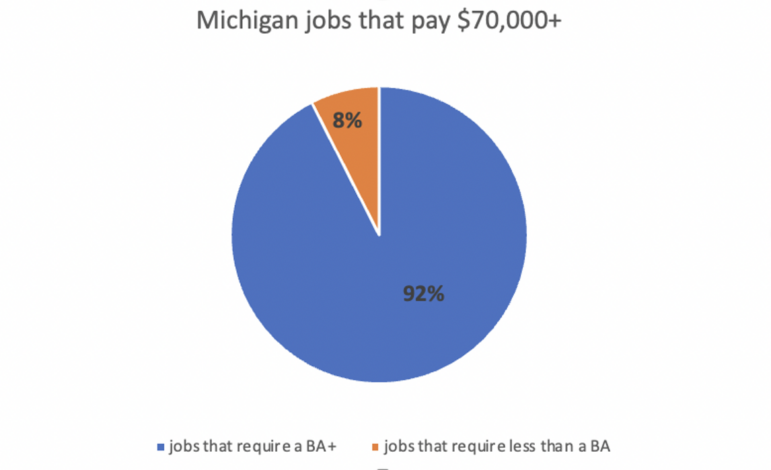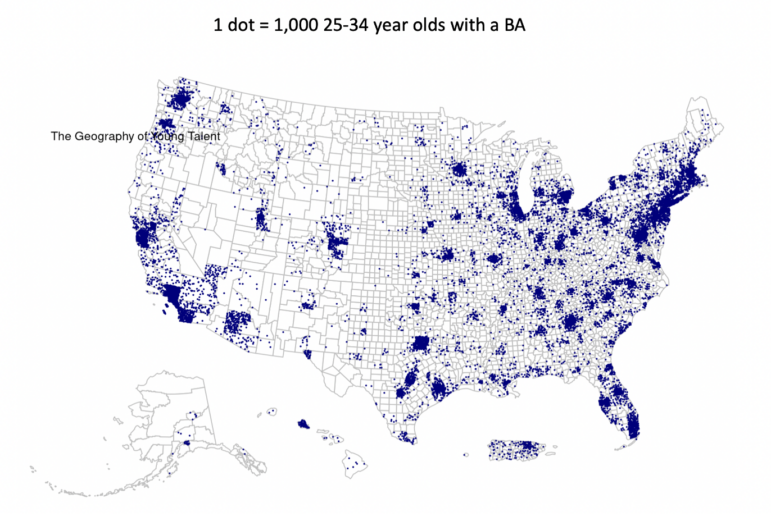Michigan’s missing young adults

There’s a lot of attention right now on the state’s population. We’re not attracting and retaining enough young people, our workforce is aging, and our economy is sputtering. In response to these challenges, the governor has formed the Growing Michigan Together Council, primarily tasked with identifying a set of recommendations for how to grow the […]
Education and opportunity in today’s labor market

A statewide survey conducted by the Detroit Regional Chamber earlier this year reported some startling data about Michiganders’ views on the value of a four-year college degree. As reported in the survey, just 26.5% of Michigan voters said a college education was “very important” to landing a successful job in Michigan, while just 27.5% said a four-year […]
What’s missed in Mississippi’s success story

New York Times opinion columnist Nicholas Kristof recently wrote an article celebrating the growth in reading scores among Mississippi 4th graders. Of Mississippi, Kristof writes “It is lifting education outcomes and soaring in the national rankings. With an all-out effort over the past decade to get all children to read by the end of the […]
Attracting and retaining young talent: the economic development strategy that really matters

In my last post, I looked at the connection between the educational attainment of the working-age population of a region or state, and the prosperity of that region or state. The short story is that at both geographic levels, the two variables are strongly correlated – if you tell me what share of 25-64 year […]
The connection between educational attainment and economic development

Most discussions about economic development in Michigan are pretty narrowly focused. How many jobs did we “create?” What companies did we “attract”, or retain? Manufacturing jobs receive the lion’s share of attention, and it’s generally understood that in order to create or retain these manufacturing jobs, we need to offer firms incentives, usually in the […]
What could an ambitious state EITC mean for Michigan families?

Every year, the US Census Bureau publishes estimates of the poverty rate in the U.S. There is the official poverty measure (OPM), which is what we use to determine eligibility for government assistance, and the supplemental poverty measure (SPM), which takes into account the impact of various social safety-net programs on overall poverty. The SPM […]
Expanding Michigan’s Earned Income Tax Credit can combat benefit cliffs

The appropriate size and scope of our social safety-net has long been a matter of disagreement between politicians, researchers, and advocates on the left and right. But one thing that seemingly everyone can agree on is that no matter how generous or meager our safety-net is, it should be devoid of so-called benefit “cliffs,” and […]
A 21st Century Education – Technology Not Required

This post originally ran in February 2017. We are rerunning it because of its relevance to the discussion we should be having about what post-pandemic education should looks like for all students. Whether in school or learning at home. Nearly everyone agrees – students today require a 21st century education. Defining what a 21st century […]
Social and emotional learning focuses on how kids are actually doing

Test scores have become the sole fixation of our education system. At least since the passage of No Child Left Behind in 2001, states, districts, schools, principals, teachers, and students have been labeled successful or failing based on the single, narrow criteria of how well they perform on tests measuring basic math and reading skills. […]
All you need to know about student loan defaults in two graphs

Earlier this year, I wrote a post breaking down newly released federal data on the student loan “crisis.” There were two big lessons that came from this data: (1) Stay away from for-profit colleges. The number of students who take out loans at these institutions and eventually default is incredibly high, even if they earn […]
